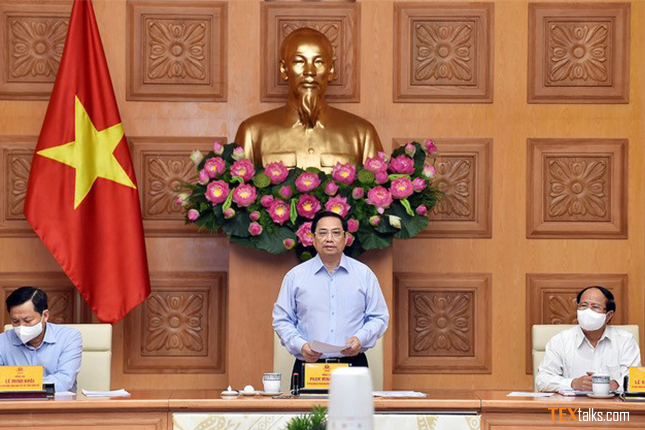The COVID-19 pandemic had impacted Vietnam’s textile industry just like any other country. It is becoming a challenge to control the spread of disease with its variations and keeping the expected textile productions at the same levels before the pandemic. Recently, Vietnam Textile and Apparel Association (VITAS) has proposed some solutions in a conference that needs to be addressed for the local textile sector. The conference was also honored with the presence of Vietnam’s Prime Minister, Mr. Pham Minh Chin. The agenda of the conference was on solutions to solve problems, remove difficulties, promote production and business of enterprises in the context of the Covid-19 pandemic.
VITAS reported to the Prime Minister the great difficulties that the textile and garment industry faces in the fourth wave of the pandemic. Among various problems discussed, the implementation of prolonged social distancing by Directive 16 of the Government in the southern provinces has caused most garment factories in these localities to close because they are not eligible to implement the “3 on-site” regulation. It was also observed that It is difficult for enterprises still operating in production because they have to reduce 50%-60% of the number of employees working to implement the distance. The supply of raw materials is broken, and at the same time, it incurs many costs to establish measures to prevent Covid, test, and vaccinate employees.
VITAS has worked with the American Apparel and Footwear Association (AAFA) and many brands, international partners, and domestic associations to have a letter to President Biden giving priority to supporting Vaccines for Vietnam. The association has also cooperated with other industry associations to find the supply of supporting vaccines. VITAS also highlighted the importance of the “dual goal” of controlling the Covid-19 pandemic, maintaining production, ensuring jobs and income for employees, and limiting supply chain disruptions; the problem is Exploiting the most and fastest source of vaccines and injecting the right people is an urgent issue.
Furthermore, VITAS has proposed:
• to remove the regulation on paying VAT for domestic fabrics used for garment exports
• to amend the Trade Union law in the direction that enterprises pay up to 1% of the trade union fee instead of 2% as at present
• to reduce road tolls, BOT fees, stop collecting seaport fees
• to reduce the interest rate to 0.5-1%/year
The Prime Minister has ensured that he will meet businesses in each field and industry to discuss more deeply, have a more suitable solution.



